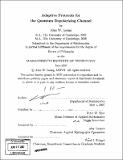Adaptive protocols for the quantum depolarizing channel
Author(s)
Leung, Alan W
DownloadFull printable version (3.161Mb)
Other Contributors
Massachusetts Institute of Technology. Dept. of Mathematics.
Advisor
Peter W. Shor.
Terms of use
Metadata
Show full item recordAbstract
In the first part, we present a family of entanglement purification protocols that generalize four previous methods, namely the recurrence method, the modified recurrence method, and the two methods proposed by Maneva-Smolin and Leung-Shor. We will show that this family of protocols have improved yields over a wide range of initial fidelities F, and hence imply new lower bounds on the quantum capacity assisted by two-way classical communication of the quantum depolarizing channel. In particular, we show that the yields of these protocols are higher than the yield of universal hashing for F less than 0.99999 and as F goes to 1. In the second part, we define, for any quantum discrete memoryless channel, quantum entanglement capacity with classical feedback, a quantity that lies between two other well-studied quantities. These two quantities - namely the quantum capacity assisted by two-way classical communication and the quantum capacity with classical feedback - are widely conjectured to be different. We then present adaptive protocols for this newly-defined quantity on the quantum depolarizing channel. These protocols in turn imply new lower bounds on the quantum capacity with classical feedback.
Description
Thesis (Ph. D.)--Massachusetts Institute of Technology, Dept. of Mathematics, 2007. Includes bibliographical references (p. 81-85).
Date issued
2007Department
Massachusetts Institute of Technology. Department of MathematicsPublisher
Massachusetts Institute of Technology
Keywords
Mathematics.